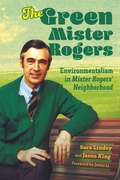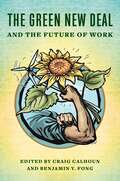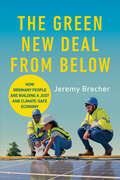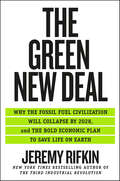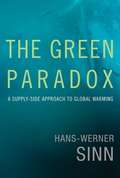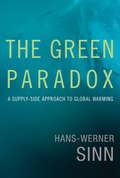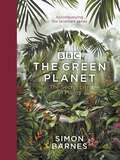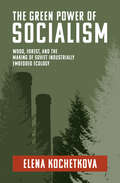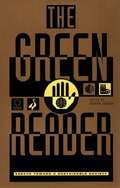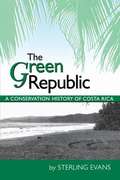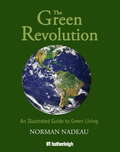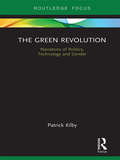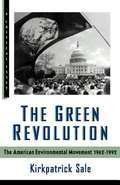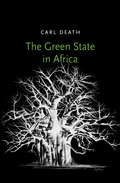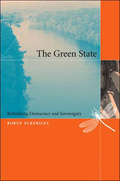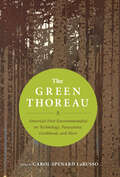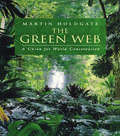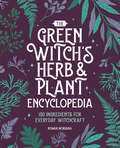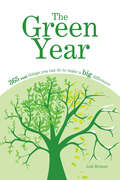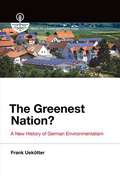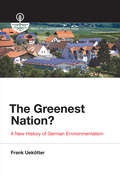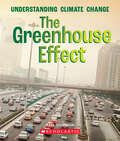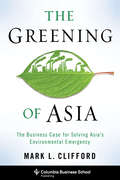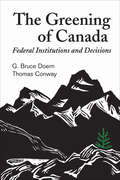- Table View
- List View
The Green Mister Rogers: Environmentalism in Mister Rogers' Neighborhood (Children's Literature Association Series)
by Jason King Sara LindeyFred Rogers was an international celebrity. He was a pioneer in children’s television, an advocate for families, and a multimedia artist and performer. He wrote the television scripts and music, performed puppetry, sang, hosted, and directed Mister Rogers’ Neighborhood for more than thirty years. In his almost nine hundred episodes, Rogers pursued dramatic topics: divorce, death, war, sibling rivalry, disabilities, racism. Rogers’ direct, slow, gentle, and empathic approach is supported by his superior emotional strength, his intellectual and creative courage, and his joyful spiritual confidence. The Green Mister Rogers: Environmentalism in “Mister Rogers’ Neighborhood” centers on the show’s environmentalism, primarily expressed through his themed week “Caring for the Environment,” produced in 1990 in coordination with the twentieth anniversary of Earth Day. Unfolding against a trash catastrophe in the Neighborhood of Make-Believe, Rogers advances an environmentalism for children that secures children in their family homes while extending their perspective to faraway places, from the local recycling center to Florida’s coral reef. Rogers depicts animal wisdom and uses puppets to voice anxiety and hope and shows an interconnected world where each part of creation is valued, and love is circulated in networks of care. Ultimately, Rogers cultivates a practical wisdom that provides a way for children to confront the environmental crisis through action and hope and, in doing so, develop into adults who possess greater care for the environment and a capacious imagination for solving the ecological problems we face.
The Green New Deal and the Future of Work
by Raj Patel Harvey Molotch Harry C. Boyte Richard Lachmann Stephanie Luce Richard A. Walker Clark A. Miller Trygve Throntveit Alyssa Battistoni Daniel Aldana Cohen Hillary Angelo Olúfẹ́mi O. Táíwò Jim Goodman Wilson Sherwin Dustin Guastella Mindy Isser Todd E. Vachon J. Mijin Cha Lara SkinnerCatastrophic climate change overshadows the present and the future. Wrenching economic transformations have devastated workers and hollowed out communities. However, those fighting for jobs and those fighting for the planet have often been at odds. Does the world face two separate crises, environmental and economic? The promise of the Green New Deal is to tackle the threat of climate change through the empowerment of working people and the strengthening of democracy. In this view, the crisis of nature and the crisis of work must be addressed together—or they will not be addressed at all.This book brings together leading experts to explore the possibilities of the Green New Deal, emphasizing the future of work. Together, they examine transformations that are already underway and put forth bold new proposals that can provide jobs while reducing carbon consumption—building a world that is sustainable both economically and ecologically. Contributors also debate urgent questions: What is the value of a federal jobs program, or even a jobs guarantee? How do we alleviate the miseries and precarity of work? In key economic sectors, including energy, transportation, housing, agriculture, and care work, what kind of work is needed today? How does the New Deal provide guidance in addressing these questions, and how can a Green New Deal revive democracy? Above all, this book shows, the Green New Deal offers hope for a better tomorrow—but only if it accounts for work’s past transformations and shapes its future.
The Green New Deal from Below: How Ordinary People Are Building a Just and Climate-Safe Economy
by Jeremy BrecherA visionary program for national renewal, the Green New Deal aims to protect the earth’s climate while creating good jobs, reducing injustice, and eliminating poverty. Its core principle is to use the necessity for climate protection as a basis for realizing full employment and social justice. Jeremy Brecher goes beyond the national headlines and introduces readers to the community, municipal, county, state, tribal, and industry efforts advancing the Green New Deal across the United States. Brecher illustrates how such programs from below do the valuable work of building constituencies and providing proofs of concept for new ideas and initiatives. Block by block, these activities have come together to form a Green New Deal built on a strong foundation of small-scale movements and grassroots energy. A call for hope and a better tomorrow, The Green New Deal from Below offers a blueprint for reconstructing society on new principles to avoid catastrophic climate change.
The Green New Deal: Why the Fossil Fuel Civilization Will Collapse by 2028, and the Bold Economic Plan to Save Life on Earth
by Jeremy RifkinNew York Times–Bestselling Author: The renowned economic theorist explains how America can—and must—create a post-fossil fuel culture to survive.We can’t keep doing business as usual. Facing a global emergency, a younger generation has spearheaded a national conversation around a Green New Deal—a movement with the potential to revolutionize society. But while the Green New Deal has become a lightning rod in the political sphere, there is a parallel movement emerging within the business community that will shake the very foundation of the global economy in coming years.Key sectors of the economy are fast-decoupling from fossil fuels in favor of ever-cheaper solar and wind energies and the new business opportunities and employment that accompany them. New studies are sounding the alarm that trillions of dollars in stranded fossil fuel assets could create a carbon bubble likely to burst by 2028, causing the collapse of the fossil fuel civilization. The marketplace is speaking, and governments will need to adapt if they are to survive and prosper.In The Green New Deal, Jeremy Rifkin delivers the political narrative and economic plan for the Green New Deal that we need at this critical moment in history. The concurrence of a stranded fossil fuel assets bubble and a green political vision opens up the possibility of a massive shift to a post-carbon ecological era, in time to prevent a temperature rise that will tip us over the edge into runaway climate change. With twenty-five years of experience implementing Green New Deal–style transitions for both the European Union and the People’s Republic of China, Rifkin offers his vision for how to transform the global economy and save life on Earth.“The Green New Deal takes a stance quite different from that of typical Green New Deal supporters . . . he’s interested in building factories, farms, and vehicles in a fossil-free world, asserting that ‘the Green New Deal is all about infrastructure.’” —The New York Times Book Review“An urgent endorsement of efforts to remake a doomed fossil-fuel economy before it’s too late.” —Kirkus Reviews
The Green Paradox
by Hans-Werner SinnThe Earth is getting warmer. Yet, as Hans-Werner Sinn points out in this provocative book, the dominant policy approach--which aims to curb consumption of fossil energy--has been ineffective. Despite policy makers' efforts to promote alternative energy, impose emission controls on cars, and enforce tough energy-efficiency standards for buildings, the relentlessly rising curve of CO2 output does not show the slightest downward turn. Some proposed solutions are downright harmful: cultivating crops to make biofuels not only contributes to global warming but also uses resources that should be devoted to feeding the world's hungry. In The Green Paradox, Sinn proposes a new, more pragmatic approach based not on regulating the demand for fossil fuels but on controlling the supply. The owners of carbon resources, Sinn explains, are pre-empting future regulation by accelerating the production of fossil energy while they can. This is the "Green Paradox": expected future reduction in carbon consumption has the effect of accelerating climate change. Sinn suggests a supply-side solution: inducing the owners of carbon resources to leave more of their wealth underground. He proposes the swift introduction of a "Super-Kyoto" system--gathering all consumer countries into a cartel by means of a worldwide, coordinated cap-and-trade system supported by the levying of source taxes on capital income--to spoil the resource owners' appetite for financial assets. Only if we can shift our focus from local demand to worldwide supply policies for reducing carbon emissions, Sinn argues, will we have a chance of staving off climate disaster.
The Green Paradox: A Supply-Side Approach to Global Warming
by Hans-Werner SinnA leading economist develops a supply-side approach to fighting climate change that encourages resource owners to leave more of their fossil carbon underground.The Earth is getting warmer. Yet, as Hans-Werner Sinn points out in this provocative book, the dominant policy approach—which aims to curb consumption of fossil energy—has been ineffective. Despite policy makers' efforts to promote alternative energy, impose emission controls on cars, and enforce tough energy-efficiency standards for buildings, the relentlessly rising curve of CO2 output does not show the slightest downward turn. Some proposed solutions are downright harmful: cultivating crops to make biofuels not only contributes to global warming but also uses resources that should be devoted to feeding the world's hungry. In The Green Paradox, Sinn proposes a new, more pragmatic approach based not on regulating the demand for fossil fuels but on controlling the supply.The owners of carbon resources, Sinn explains, are pre-empting future regulation by accelerating the production of fossil energy while they can. This is the “Green Paradox”: expected future reduction in carbon consumption has the effect of accelerating climate change. Sinn suggests a supply-side solution: inducing the owners of carbon resources to leave more of their wealth underground. He proposes the swift introduction of a “Super-Kyoto” system—gathering all consumer countries into a cartel by means of a worldwide, coordinated cap-and-trade system supported by the levying of source taxes on capital income—to spoil the resource owners' appetite for financial assets.Only if we can shift our focus from local demand to worldwide supply policies for reducing carbon emissions, Sinn argues, will we have a chance of staving off climate disaster.
The Green Pharmacy Herbal Handbook
by James O. DukeIn this handy companion to his best-selling book The Green Pharmacy, leading herbal authority James A. Duke, Ph.D.., delivers the lowdown on virtually every healing herb available in today's marketplace: its description and history, therapeutic uses, medicinal properties, prescription counterparts, dosage options, safety and effectiveness rating, and precautions. Dr. Duke's inimitable folksy tone and friendly manner shine throughout The Green Pharmacy Herbal Handbook, making it as entertaining to read as it is practical. The most thorough,and comprehensive herb reference of its kind, the handbook was culled from the thousands of entries in Dr. Duke's database of the world's medicinal plants. The database, which he began during his career as a top botanist with the USDA, is a lifelong project for Dr. Duke and has become a major reference resource for herbalists worldwide.
The Green Planet: (ACCOMPANIES THE BBC SERIES PRESENTED BY DAVID ATTENBOROUGH)
by Simon BarnesPraise for The Green Planet (BBC One)'David Attenborough's gobsmacking, awe-inspiring return' The Guardian'The Green Planet reveals the secret lives of plants in the same way The Blue Planet opened our eyes to the oceans' New ScientistThere's something new under the sunPlants live secret, unseen lives - hidden in their magical world and on their timescale. From the richest jungles to the harshest deserts, from the snowiest alpine forest to the remotest steaming swamp, Green Planet travels from one great habitat to the next, showing us that plants are as aggressive, competitive and dramatic as the animals on our planet. You will discover agents of death, who ruthlessly engulf their host plant, but also those that form deep and complex relationships with other species, such as the desert cacti who use nectar-loving bats to pollinate. Although plants are undoubtedly the stars of the show, a fascinating new light will be shed on the animals that interact with them.Using the latest technologies and showcasing over two decades of new discoveries, Green Planet reveals the strange and wonderful life of plants like never before - a life full of remarkable behaviour, emotional stories and surprising heroes.
The Green Power of Socialism: Wood, Forest, and the Making of Soviet Industrially Embedded Ecology (History for a Sustainable Future)
by Elena KochetkovaHow the Soviet forestry industry developed a unique form of industrial ecology—a commonsense approach toward natural resources for the economy and society.In The Green Power of Socialism, Elena Kochetkova examines the relationship between nature and humans under state socialism by looking at the industrial role of Soviet forests. The book explores evolving Soviet policies of wood consumption, discussing how professionals working in the forestry industry of the Soviet state viewed the present and future of forests by considering them both a natural resource and a trove of industrial material. When faced with the prospect of wood shortages, these specialists came to develop new industry-ecology paradigms. Kochetkova looks at the materiality of Soviet industry through forests and wood to show how, paradoxically, industrial ecology emerged and developed as a by-product of the Soviet industrialization project.The Green Power of Socialism also discusses how post-Soviet industry has abandoned these socialist practices and the idea of nature as a complicated ecosystem that provides a crucial service to society. Emphasizing the technological and environmental impacts of the Cold War, Kochetkova critically reconsiders two explanatory models that have become dominant in the historiography of Soviet approaches to nature over the last decades—ecocide and environmentalism. Within the context of the current environmental crisis, the book invites readers to reevaluate state socialism as a complex phenomenon with sophisticated interactions between nature and industry. In so doing, it contributes a fresh perspective on the activities of socialist experts and their view of nature, shedding light on Soviet state industrial and environmental policy and its continuing legacy in the present day.
The Green Reader: Essays Toward a Sustainable Society
by Andrew DobsonThe Green Reader collects key source documents of today's most important social/scientific/philosophical movement-the Green movement.
The Green Republic: A Conservation History of Costa Rica
by Sterling EvansWith over 25 percent of its land set aside in national parks and other protected areas, Costa Rica is renowned worldwide as "the green republic. " In this very readable history of conservation in Costa Rica, Sterling Evans explores the establishment of the country's national park system as a response to the rapid destruction of its tropical ecosystems due to the expansion of export-related agriculture. Drawing on interviews with key players in the conservation movement, as well as archival research, Evans traces the emergence of a conservation ethic among Costa Ricans and the tangible forms it has taken. In Part I, he describes the development of the national park system and "the grand contradiction" that conservation occurred simultaneously with massive deforestation in unprotected areas. In Part II, he examines other aspects of Costa Rica's conservation experience, including the important roles played by environmental education and nongovernmental organizations, campesino and indigenous movements, ecotourism, and the work of the National Biodiversity Institute.
The Green Revolution
by Norman NadeauEver Wonder What A Green Renewable Sustainable World Would Look Like?With the state of our world and its limited resources, more and more people are trying to lead a greener lifestyle in order to do their part. The Green Revolution provides comprehensive information associated with adopting daily practices that will ultimately sustain, not deplete, precious natural materials in an ever-growing population.Renewable energy expert Norman Nadeau leads by example as he details how he has committed his life to living green. From the application of solar and wind turbine technology, to recovering energy embedded in places one may not expect (such as animals' manure), The Green Revolution highlights the highly sustainable system Norman Nadeau developed for his family farm.The Green Revolution serves as a broad introduction for those who want to conserve rather than squander. At this very important turning point in our planet's history, this book offers the principles by which anyone can live in the most sustainable way possible.
The Green Revolution: Narratives of Politics, Technology and Gender (Earthscan Food and Agriculture)
by Patrick KilbyThis book reviews the Green Revolution, starting with its inception and development from the 1940s to the 1970s, and leading to what is commonly referred to as a second Green Revolution in the 2000s. Building on the historical assessment, it draws insights for contemporary policy debates and demonstrates important lessons for the here and now. ‘Green Revolution’ refers to the technical measures employed to increase food (particularly grain) production, based mainly on improved seed varieties for higher yields and pest resistance. For it to be successful the Green Revolution often required land reform, investments in irrigation and fertilizer supply that were not available to women and marginal farmers. This book analyses three underlying principles that have guided green revolutions: the political environment in which they were set; how they contributed to both the successes and challenges the Green Revolution continues to face; and the systemic institutional barriers for access to these agricultural production advances, with a focus on how gender relations limit the inclusion of women even when they are the principle cultivators and farm managers. The book draws on experiences in Mexico, India and China, examining government policy, the role of the family farm, and key issues around the inclusion of women. In doing so, this book connects the history of the Green Revolution with contemporary policy debates on the developing world, particularly in relation to Africa and Asia, around foreign aid and agricultural research. It also specifically establishes that greater inclusivity for women and other marginalised farming communities will significantly enhance the effectiveness of these programs. Interlinking themes of development policy, gender, and agricultural research, this book will be of great interest to students and scholars of agricultural development, food security, and sustainable development, as well as policymakers and practitioners working in international aid and agri-food policies.
The Green Revolution: The American Environmental Movement (1962-1992)
by Eric Foner Kirkpatrick SaleThe Hill and Wang Critical Issues Series: concise, affordable works on pivotal topics in American history, society, and politics. The Green Revolution documents the tremendous change in public awareness and attitudes since the publication of Rachel Carson'sSilent Spring. Sale assesses the growth of national environmental organizations and the influence of scientists and their theories about global warming, the greenhouse effect, acid rain, toxic waste, and biodiversity. And he shows how environmental concerns affect all levels of society and much of our government's legislative and regulatory work.
The Green State in Africa
by Carl DeathA provocative reassessment of the relationship between states and environmental politics in Africa From climate-related risks such as crop failure and famine to longer-term concerns about sustainable urbanization, environmental justice, and biodiversity conservation, African states face a range of environmental issues. As Carl Death demonstrates, the ways in which they are addressing them have important political ramifications, and challenge current understandings of green politics. Death draws on almost a decade of research to reveal how central African environmental politics are to the transformation of African states.
The Green State: Rethinking Democracy and Sovereignty
by Robyn EckersleyWhat would constitute a definitively "green" state? In this important new book, Robyn Eckersley explores what it might take to create a green democratic state as an alternative to the classical liberal democratic state, the indiscriminate growth-dependent welfare state, and the neoliberal market-focused state—seeking, she writes, "to navigate between undisciplined political imagination and pessimistic resignation to the status quo." In recent years, most environmental scholars and environmentalists have characterized the sovereign state as ineffectual and have criticized nations for perpetuating ecological destruction. Going consciously against the grain of much current thinking, this book argues that the state is still the preeminent political institution for addressing environmental problems. States remain the gatekeepers of the global order, and greening the state is a necessary step, Eckersley argues, toward greening domestic and international policy and law.The Green State seeks to connect the moral and practical concerns of the environmental movement with contemporary theories about the state, democracy, and justice. Eckersley's proposed "critical political ecology" expands the boundaries of the moral community to include the natural environment in which the human community is embedded. This is the first book to make the vision of a "good" green state explicit, to explore the obstacles to its achievement, and to suggest practical constitutional and multilateral arrangements that could help transform the liberal democratic state into a postliberal green democratic state. Rethinking the state in light of the principles of ecological democracy ultimately casts it in a new role: that of an ecological steward and facilitator of transboundary democracy rather than a selfish actor jealously protecting its territory.
The Green Thoreau: America's First Environmentalist on Technology, Possessions, Livelihood, and More
by Henry David ThoreauHenry David Thoreau saw nature as teacher and companion, and many of his philosophies guide the contemporary environmental movement. What Thoreau wrote about simplicity, materialism, technology, and our troubled relationship with nature is perhaps even more relevant to our lives today than it was in the nineteenth century. In these pages, editor Carol Spenard LaRusso presents quotations by Thoreau on nature, technology, livelihood, living, possessions, time, diet and food, and aspiration. At turns passionate, funny, and profound, this collection serves as a compelling introduction — or vivid reminder — of why Thoreau is one of America’s iconoclastic greats.
The Green Web: A Union for World Conservation
by Martin HoldgateThis text is a history of the world's oldest global conservation body - the World Conservation Union, established in 1948 as a forum for governments, non-governmental organizations and individual conservationists. The author draws on unpublished archives to reveal the often turbulent story of the IUCN and its achievements in, and influence on, conservation and environmental policy worldwide - establishing national parks and protected areas and defending threatened species.
The Green Witch's Herb and Plant Encyclopedia: 150 Ingredients for Everyday Witchcraft
by Rowan MorganaEverything you need to know about using plants and herbs for green witchcraftInfusing your craft with plants and herbs is a powerful way to connect to Mother Earth. This green witchcraft encyclopedia explores the most essential magical plants, offering you a complete resource for safely growing, foraging, harvesting, and using everything from aloe to valerian. Discover greater harmony with nature as you harness the natural energy of plants to create healing and balance in your life.150 plant profiles — Find detailed entries for the plants and herbs green witches use the most, including photos, explanations of each plant's magical properties, and tips for how to grow them yourself.Herb magic in action — Experience the power of plant magic with spells and rituals to try, such as banishing negativity with catnip and clover or building a fairy altar with foxglove and thyme.Embrace your inner witch — Part reference guide and part grimoire, this book of herbs helps you develop your practice by exploring how to set intentions, create a sacred space, and maintain your own garden.Start your own witch's apothecary and create some everyday magic with this encyclopedia of magical herbs and plants.
The Green Year: 365 Small Things You Can Do to Make a Big Difference
by Jodi HelmerGo green one day at a time. Do something every day. Most of us want to do the right thing for the environment, but making the commitment to change our fast-paced, convenience-oriented lifestyles can be more than a little daunting. What&’s the answer? Take that giant commitment and cut it up into 365 little commitments that get met one day at a time. The Green Year does just that. More than a calendar, it offers simple, practical, affordable, and engaging activities that make going green a blessing rather than a burden. In addition to these easy green suggestions, readers will find in The Green Year: • The &“why&” behind each activity—what makes it good for the environment and the reader? • A quick &“how-to&” for any activity that requires it • Room for readers to write in their own creative alternatives • Helpful illustrations
The Greenest Nation?
by Frank UekötterGermany enjoys an enviably green reputation. Environmentalists in other countries applaud its strict environmental laws, its world-class green technology firms, its phase-out of nuclear power, and its influential Green Party. Germans are proud of these achievements, and environmentalism has become part of the German national identity. In The Greenest Nation? Frank Uekötter offers an overview of the evolution of German environmentalism since the late nineteenth century. He discusses, among other things, early efforts at nature protection and urban sanitation, the Nazi experience, and civic mobilization in the postwar years. He shows that much of Germany's green reputation rests on accomplishments of the 1980s, and emphasizes the mutually supportive roles of environmental nongovernmental organizations, corporations, and the state. Uekötter looks at environmentalism in terms of civic activism, government policy, and culture and life, eschewing the usual focus on politics, prophets, and NGOs. He also views German environmentalism in an international context, tracing transnational networks of environmental issues and actions and discussing German achievements in relation to global trends. Bringing his discussion up to the present, he shows the influence of the past on today's environmental decisions. As environmentalism is wrestling with the challenges of the twenty-first century, Germany could provide a laboratory for the rest of the world.
The Greenest Nation?: A New History of German Environmentalism (History for a Sustainable Future)
by Frank UekotterAn account of German environmentalism that shows the influence of the past on today's environmental decisions.Germany enjoys an enviably green reputation. Environmentalists in other countries applaud its strict environmental laws, its world-class green technology firms, its phase-out of nuclear power, and its influential Green Party. Germans are proud of these achievements, and environmentalism has become part of the German national identity. In The Greenest Nation? Frank Uekötter offers an overview of the evolution of German environmentalism since the late nineteenth century. He discusses, among other things, early efforts at nature protection and urban sanitation, the Nazi experience, and civic mobilization in the postwar years. He shows that much of Germany's green reputation rests on accomplishments of the 1980s, and emphasizes the mutually supportive roles of environmental nongovernmental organizations, corporations, and the state.Uekötter looks at environmentalism in terms of civic activism, government policy, and culture and life, eschewing the usual focus on politics, prophets, and NGOs. He also views German environmentalism in an international context, tracing transnational networks of environmental issues and actions and discussing German achievements in relation to global trends. Bringing his discussion up to the present, he shows the influence of the past on today's environmental decisions. As environmentalism is wrestling with the challenges of the twenty-first century, Germany could provide a laboratory for the rest of the world.
The Greenhouse Effect (A True Book (Relaunch))
by Mara GrunbaumWhat controls Earth's temperature? How do the changes happening now compare to those that have happened in the past? This book lays out how the makeup of Earth's atmosphere can affect everything living beneath it, and how human activities - from cutting down trees to burning fossil fuels - are changing the climate worldwide.Glaciers are melting. Summers are heating up. Sea levels are on the rise. Climate change is affecting every corner of our planet - and it's the subject of a lot of concern, activism, and debate. STEM meets current events in this new A True Book set that offers readers the chance to learn about the causes and effects of climate change, as well as how people around the world are reacting to it. Students will read about the history and scope of the problem, analyze the same kinds of evidence that scientists do, and come away with tools that will help them respond to this pressing global issue.This series covers Next Generation Science Standards core ideas including Weather and Climate, Human Impacts on Earth Systems, Conservation of Energy and Energy Transfer, and Biodiversity and Humans.
The Greening of Asia: The Business Case for Solving Asia's Environmental Emergency (Columbia Business School Publishing Ser.)
by Mark CliffordOne of Asia's best-respected writers on business and economy, Hong Kong-based author Mark L. Clifford provides a behind-the-scenes look at what companies in China, India, Japan, Korea, the Philippines, Indonesia, Hong Kong, Singapore, and Thailand are doing to build businesses that will lessen the environmental impact of Asia's extraordinary economic growth. Dirty air, foul water, and hellishly overcrowded cities are threatening to choke the region's impressive prosperity. Recognizing a business opportunity in solving social problems, Asian businesses have developed innovative responses to the region's environmental crises. From solar and wind power technologies to green buildings, electric cars, water services, and sustainable tropical forestry, Asian corporations are upending old business models in their home countries and throughout the world. Companies have the money, the technology, and the people to act—yet, as Clifford emphasizes, support from the government (in the form of more effective, market-friendly policies) and the engagement of civil society are crucial for a region-wide shift to greener business practices. Clifford paints detailed profiles of what some of these companies are doing and includes a unique appendix that encapsulates the environmental business practices of more than fifty companies mentioned in the book.
The Greening of Canada: Federal Institutions and Decisions
by G. Bruce Doern Thomas ConwayEnvironmental matters have become increasingly important in Canadian and world policy agendas. In this study, G. Bruce Doern and Thomas Conway trace the development of Canadian environment policy, giving an in-depth account of twenty years of environmental politics, politicians, institutions, and decisions as seen through the evolution of Ottawa's policy agency, Environment Canada. The Greening of Canada is an extensively researched look at the entire period from the early 1970s to the present and is the most complete and integrated analysis yet of federal environmental institutions and key decisions. From Great Lakes pollution to the Green Plan, from the Stockholm Conference to the post–Rio Earth Summit era, the authors deal with both domestic and international events and influences on Ottawa's often abortive efforts to entrench a green agenda into national politics. The book explores the crucial relationships of institutional and political power, directing attention at the DOE and its parade of ministers, intra-cabinet battles, federal-provincial relations, business relations and public opinion, and international and Canada–U.S. relations. It also examines important topics from acid-rain policy to the politics of establishing national parks, and from the Green Plan to the realities of environmental enforcement. Employing a framework cast as the 'double dynamic' of environmental policy making, the authors show the growing struggle between the management of power among key institutions and the need to accommodate a biophysical realm characterized by increased uncertainty as well as scientific and technological controversy.
